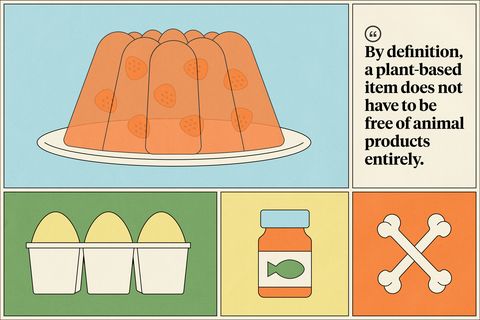From gearpatrol.com
Ostensibly, they mean similar things. But they carry important distinctions you should know
Of all the varying food and lifestyle words and phrases currently floating around, two terms are growing rapidly in popularity around the world: vegan and plant-based. In fact, plant-based foods just eclipsed a record-breaking $8 billion mark in U.S. retail for the first time ever. While the two terms seem similar, there are some very important, significant distinctions between the two. Put simply: these terms are not interchangeable, despite how synonymous they may appear to be.
To make navigating this increasingly prominent and sometimes confusing landscape a bit simpler, we're taking a deeper dive. Here's what each term means, what they have in common and how they are different.
Plant-Based: A Diet-Focused Decision
Technically speaking, "plant-based" can refer to anything from food to clothing (and really any other consumer product). More often than not, however, it refers specifically to food items. Defined by Dictionary.com, the term means "relating to or being a food consisting entirely or mainly of whole or minimally processed plant parts, such as vegetables, fruits, grains, nuts, legumes, and seeds."
Evan Richards
Generally speaking, plant-based food is vegan. But that first part of the definition — "consisting entirely or mainly" — is what should cause some concern for those trying to avoid animal products entirely. That's because, by definition, a plant-based item does not have to be totally free of animal products. It may contain a litany of animal-derived ingredients including egg, dairy, bones (gelatine), shells (shellac or confectioner's glaze), fish oil, proteins and more. Look on the back of an ice cream pint labelled plant-based rather than vegan, for example, and you are likely to spot at least one of these ingredients.
By definition, a plant-based item does not have to be totally free of animal products.
People who partake in a plant-based diet typically do so for different reasons than those who embrace veganism. Perhaps one of the best examples is the popular Forks Over Knives organization. Inspired by a book and documentary of the same name, Forks Over Knives promotes a plant-based diet that is not expressly vegan. Rather (in the organization's own terms), it seeks to empower people to eat "whole, unrefined or minimally refined plant foods and [exclude] or [minimize] meat, dairy products, eggs, and highly refined foods such as bleached flour, refined sugar, and oil." Founder Brian Wendel is a big believer in "the disease-reversing power of a plant-based diet." In other words, it's more about health than a moral stance. Vegan: A Comprehensive Lifestyle
While "plant-based" is largely focused on food, veganism is a complete and overarching lifestyle choice in which someone, per Dictionary.com, "does not use any animal products, as leather or wool" and "omits all animal products from the diet." There is also usually a moral aspect to this lifestyle choice, with most vegans believing that animals of every kind deserve full, natural lives and should not be kept in captivity or made to suffer for food, style, convenience and/or any other reason. Furthermore, there are sometimes environmental concerns at the core of these beliefs. As Oxford University's Joseph Poore, a biology and climatology researcher, has been famously quoted by the United Nations Climate Change branch: "A vegan diet is probably the single biggest way to reduce your impact on planet Earth, not just greenhouse gases, but global acidification, eutrophication, land use and water use." "A vegan diet is probably the single biggest way to reduce your impact on planet Earth."
While someone does not need to adhere to either or both of these ideologies in order to live a vegan lifestyle, they are among the chief reasons people choose these diets. Others include health (including managing chronic and/or life-threatening conditions, like cancer and cardiovascular disease), beauty and the influence of family, friends and peers. These are just a few reasons why someone might be vegan; ultimately, the choice is entirely personal.

No comments:
Post a Comment